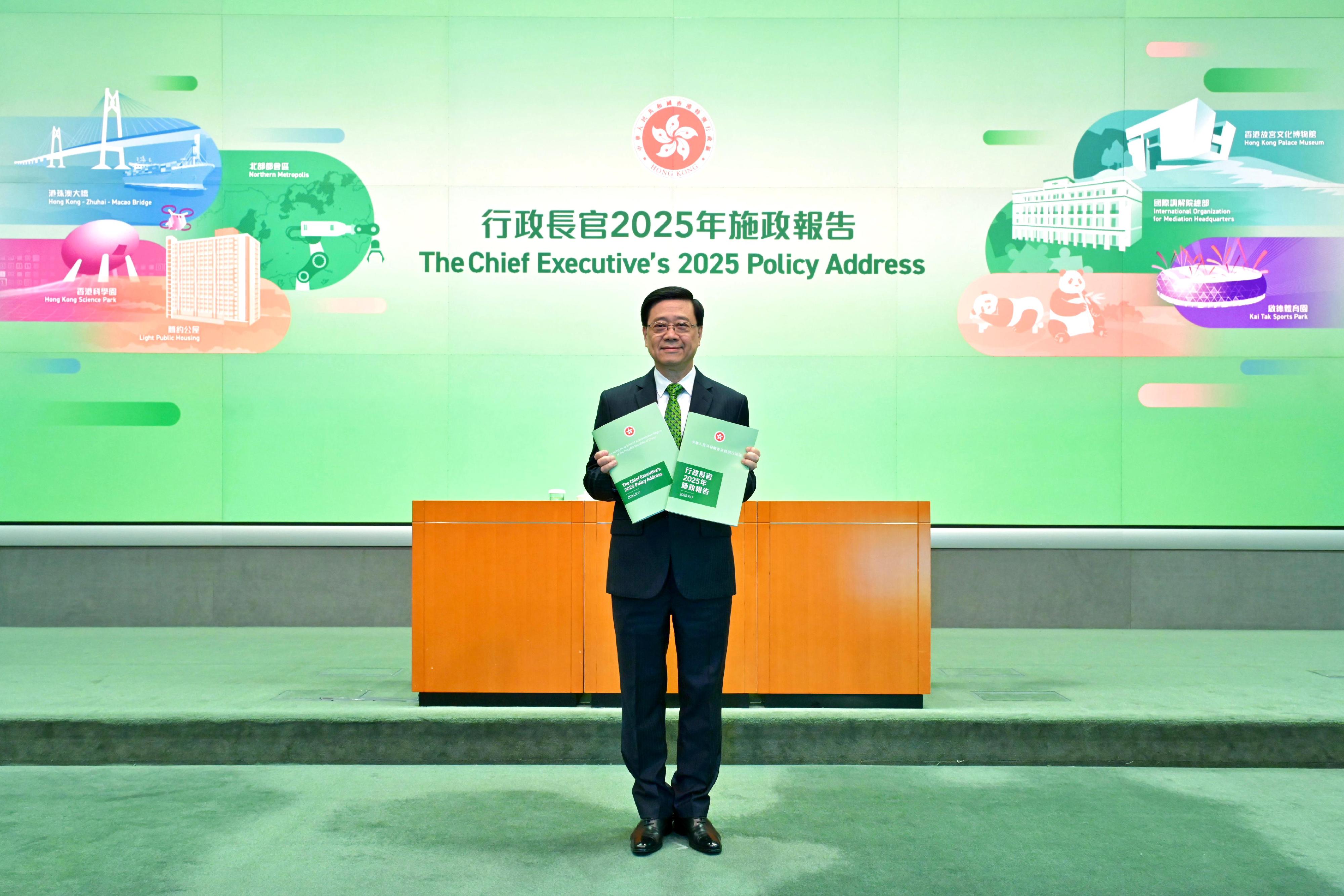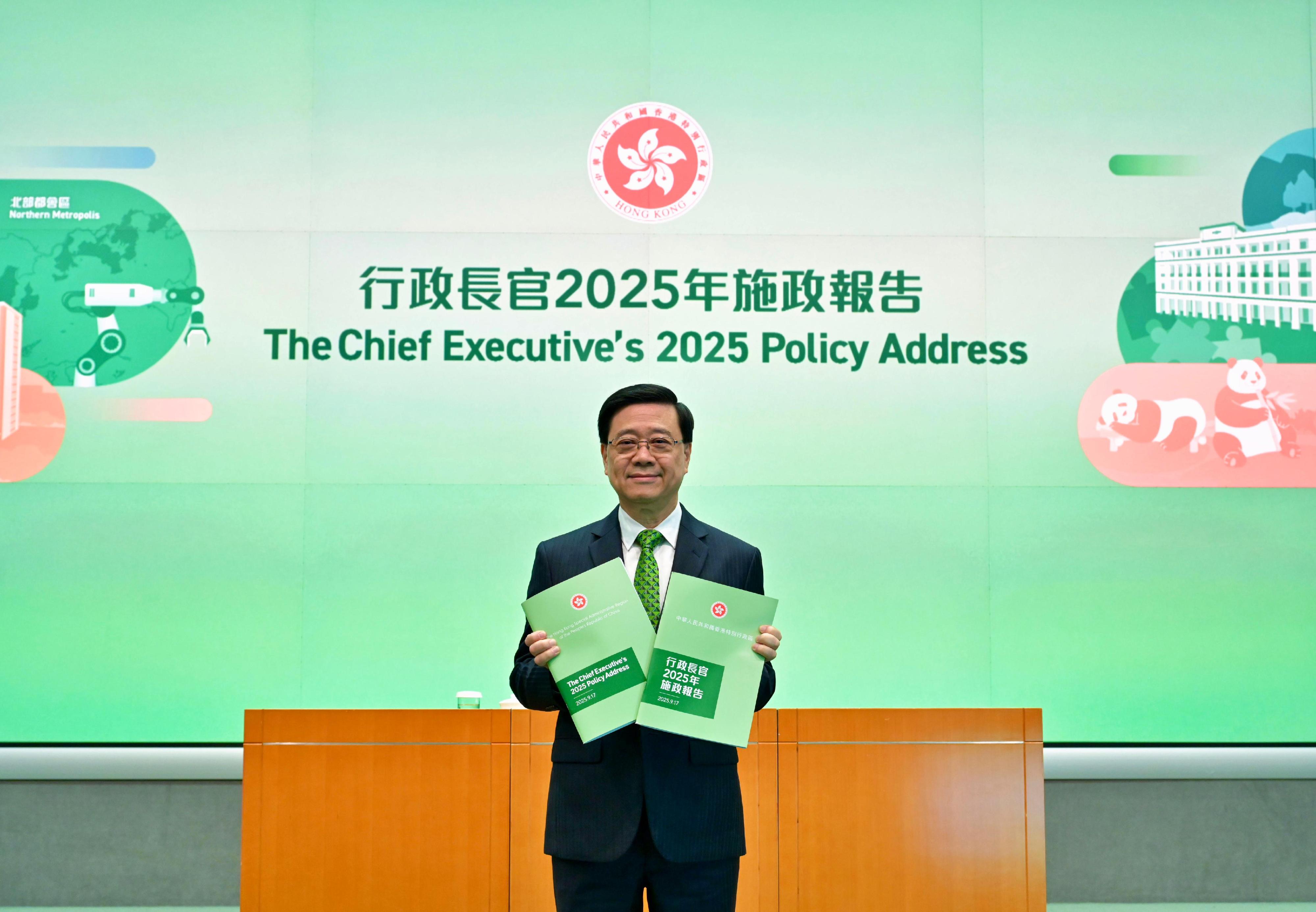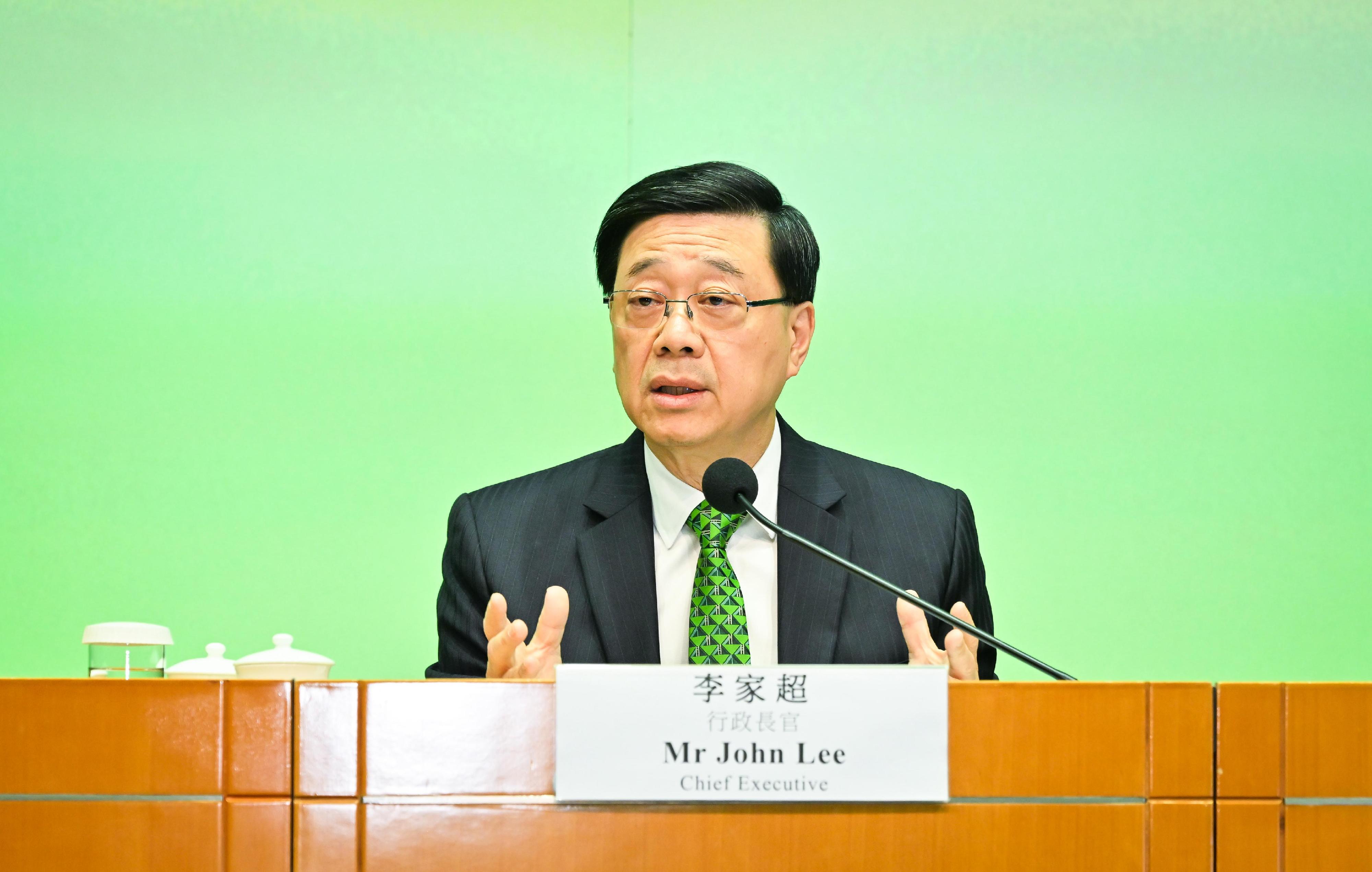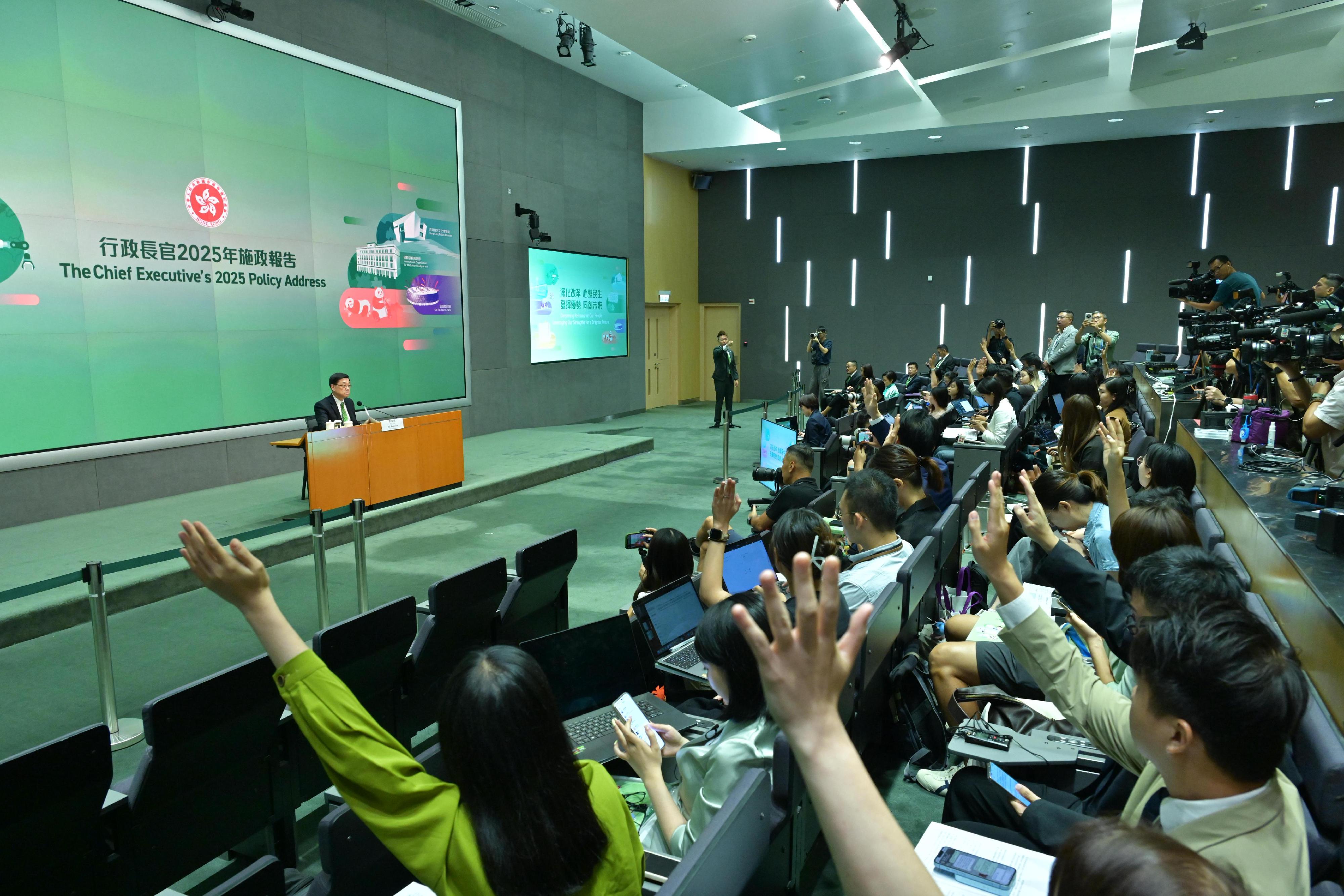Remarks by CE at press conference on "The Chief Executive's 2025 Policy Address" (with photos/video)
******************************************************************************************
Reporter: Good afternoon, Mr Lee. Some English questions. Firstly, in your Policy Address, you mentioned that the Government will assist local media to expand their network beyond Hong Kong to tell the good stories of Hong Kong. Could you elaborate on exactly what this means, such as what markets the Government is looking at, or what outlets the Government is trying to assist? Also, what will you do to ensure that the whole initiative will not backfire - the media would then be seen as losing their credibility when they are seen as government mouthpieces? The second question: with the new Heads of Department (HoD) Accountability System, are you worried about that having this new scheme would lead to the exodus of executive officers and administrative officers and worsen this exodus? And also, when do you hope to apply this new Heads of Department Accountability System? Will officers or political appointees that are involved in recent scandal, like the head of the Government Logistics Department, Carlson Chan, also be covered under this new accountability system? Thank you.
Chief Executive: I believe that Hong Kong has a lot of good things to offer to the world, one being the media. The media, here you are amongst them, are professional. They have a lot to offer. What I intend to do is to do it slowly, progressively, because this is the first time I think of working together to tell the good Hong Kong stories through different sectors, participants and leaders. I also find that the media industry is facing a lot of challenges. Like what I am doing for all the family members of Hong Kong - businesses, industry, labour - whatever I can do to help them, I will try my best. I want to expand markets for them so that they will have new business opportunities. I think what I am trying to do is opening doors for the media to do their own things. I will not interfere with what they do, and I think our media are professional enough to impress their partners overseas that what they are doing is not just professional but of a very high standard. I have faith in them, so that is what I believe is the right thing to do, particularly when I have this idea of making use of Hong Kong as a platform to go out of Hong Kong. For anybody who can benefit from this new policy of going out, I will do my best to help because any members of this family’s good will be the overall good of Hong Kong.
The other reason, which I have said when I answered a similar question in Chinese, is that I believe the media themselves have their network, and they will be helpful in telling the good and true Hong Kong stories through their network. If I can help them tell these true and good Hong Kong stories, I think I should, again, try to help them. I also want the media to know that the Government takes care of all sectors. I have been establishing good communication with a lot of media friends. I hope I can build up that relations with professional reporters such as you here now, but I don't have the time, so I have to do it in an organisational way, and that is my offer in the Policy Address. I think my offer is right because I do think they are good, I do think they have a lot to offer, I do think they can make use of their network to tell the Hong Kong stories, and I do hope that by doing this, I can make business more sustainable for them.
The other thing is about the HoD Accountability System. I must make it clear. First of all, HoDs have always been accountable for the performance of the departments, but never in the history of Hong Kong has it been systemised. Without systemising it, there is the downside of not being certain about, first of all, who will investigate, whether it will be fair and independent, and what the possible outcomes are? Who will do the investigation? I think a system that is so clear and all laid out will be beneficial to overall morale because uncertainty is not a healthy thing. Creating certainty is what creating a system is all about. I am telling people what this accountability system's purposes are. I have laid out three purposes. I have also defined very clearly the two levels of investigation, and I have also stated very categorically that there will be a dedicated team ready for action. They are familiar with the systems of the Government and have always been involved in disciplinary matters, so they will be dealing with it impartially, efficiently and effectively, and they will be ready. I think this is a system which helps people understand even more what the Government wants them to do. Here, I place a special emphasis on heads of departments, because I always believe that policymaking is the responsibility of politically appointed officials, and it has happened in my term that I have changed people, and that is the accountability system for politically appointed officials. I can still exercise my power under that accountability system. For civil servants, they have another system regarding how to manage them. Their employment is in accordance with all laid-down regulations. The management and control system of the civil servants is by and large quite good because if it is not good, we will not be number two in the world for government efficiency. Let's face it: despite the fact that even I sometimes am not happy with some of the performances, by and large in this forest of governments, we are the second tallest tree in this government forest, but I believe in continuous improvement. There is never the best, only the better. Occasionally there will be problems, and I want those problems to be rectified early, so that you will continue to have confidence in the Government. Yes, we make mistakes, but when we make mistakes, we rectify them. I think we all are so pragmatic. When I rectify them, there will be consequences, but you have to be clear and fair to everybody, so that those who are affected know what this is all about. Clarity, systemisation and fairness are the principal ingredients here.
Another purpose of creating this HoD accountability: yes, it has a punitive factor, but the main purpose is not on this, because by and large, I think they are doing very well. There are occasional lapses; we will deal with them. It is a system to encourage them to build an even stronger and healthier system of control and management. I look for continuous improvement. If a head of department knows that well, if there is no continuous improvement, there may be a problem, and then I will be accountable. They will continuously look for improvement. This promotion of a positive culture will be enhanced by this HoD Accountability System.
Your question about whether people will worry about this system and then not be interested in the jobs: if they think like this, they better go. The Government has a responsibility to serve the public well. I strongly believe in the ethics and professionalism of my civil servants that they join this Government to serve the public, particular senior officers, when actually in the market they are relatively not as well paid for quite a number of jobs. That is why you see there is indeed exodus of some government officials to the private sector. They are grabbing my talent because they know they are talent; they are good, but if there is one or two particular persons who are worried about this, then they are not qualified to be an HoD. One thing any leader should feel shamed about is that when his team, who are working so hard, don't get the compliments they deserve, the blame should be on the leader. I think that is what I want to change, and I do believe that my HoDs are all very good. Occasionally there are lapses; we will deal with those lapses fairly because I have said here very clearly, according to the level of the problem, we will deal with them accordingly, whether administratively or disciplinarily. For the bad cases, of course, under the disciplinary code, he can get the hardest, harshest punishment. But on the other hand, there are a lot of good, very devoted civil servants every day doing their jobs. You can see them when there is severe weather; they all go out. You can see them when we want to test the Kai Tak Stadium; they are all committed to helping making this a success. There are many very devoted professional civil servants I feel so proud of, and this is obviously reflected in the number two highest rating internationally by an independent organisation's assessment. I strongly believe my HoDs are very responsible officials, and we will be creating a system that will encourage people to become better.
Reporter: Regarding the bottled water procurement scandal last month, would an incident of that nature, or that level of severity, activate the new system? Also, will there be any appeal mechanism following an investigation? The other question is related to AI (artificial intelligence) development. Currently, a number of leading AI tools, especially those developed by US (United States) tech companies, are not readily available in Hong Kong. Would that impair your plan to develop AI application in Hong Kong, and does the Government have plans to negotiate with foreign companies to bring more AI tools into Hong Kong? Thank you.
Chief Executive: For the HoD (Head of Department) Accountability System, first of all, the team has to be set up through regulations made under the relevant law. It will, I think, take some time for this to be debated in LegCo (Legislative Council). It will be a subsidiary legislation. And also we will, of course, communicate with our staff and our representatives, to seek their views. But I must emphasise, there is always a HoD accountability system. There's always such a system. What I'm doing here is to create more certainty, create a proper, institutional framework, and also ensure that it will be an efficient, effective and fair system for all. One advantage you will see in this system is usually when something happens, then there will be an enquiry to identify the problems. After the problems are identified, then there will be a second enquiry to identify misconduct. But this new HoD system can combine the two. In other words, while problems are being identified, accountability will be identified as well, and what it will create is efficiency. We will shorten two processes into one.
And when you talk about a recent incident, as I have said that the dedicated team hasn't been established, so we can't have the dedicated team to investigate it. But as I always said, accountability always exists, whether this system comes in or not. That accountability will not go away. It will be dealt with in accordance with the present framework, where we identify problems and responsibilities and deal with it accordingly. But the new system will create clarity, certainty, efficiency, impartiality, and also trust in the system.
And you have talked about AI. AI, I think, is something we must do, otherwise you will be relegated to the end of any competition. Besides, AI does help us to do things better. One example I have quoted in my Policy Address is that using AI, the Census and Statistics Department, they can, out of thousands of reports published by an organisation, extract that by AI, and then the efficiency increases manifold. Another example, which I haven't mentioned in the Policy Address, is they may, on one occasion, have to count the number of ships in a particular sea area in order to identify the statistical product for society. What they do, they have to usually go and count the number of ships, but that is with AI, with aerial photography. Then they have done an exercise to compare the results. The results are not just the same; it’s even better, and the amount of time saved is again, manifold. So AI is a must for efficiency enhancement. That is application only, but AI itself can be an industry. And AI has to be an industry for it to thrive, for it to prosper, for it to become even better. And one thing AI needs is, first of all, data. The second is, application. In what area should it be applied? So widely promoting AI application is to make AI become AI-plus. I mean, the AI-plus concept is very similar to the Internet. We had the stage of the Internet. We have had the stage of Internet-plus, in other words, the Internet of Things. We are living now in a world where everything is connected. It's not just a network, it's not just Internet, it's Internet-plus. AI will develop to a stage where it will become AI-plus. In other words, it will not just be a tool, it will not just be an industry. It will integrate different areas. We may have quite a different way of living through AI, something we have to keep watching and see how it develops.
So AI is a must, and our position is clear. Hong Kong is a free port and an open society. We welcome any technology, any companies to come in, and foreign companies that have been setting up offices in Hong Kong have reached a record high, and that is reflected in my Policy Address. We welcome companies from different parts of the world to come to Hong Kong for business, AI or non-AI, and that is what Hong Kong is about. It's a free and open port. It is a place where we have no control on capital, people-to-people travel, money and also data and goods. Hong Kong is where we make the place convenient to do business and be business friendly.
(Please also refer to the Chinese portion of the remarks.)
Ends/Wednesday, September 17, 2025
Issued at HKT 22:18
Issued at HKT 22:18
NNNN
Photo
Audio / Video
CE hosts press conference on "The Chief Executive's 2025 Policy Address"








